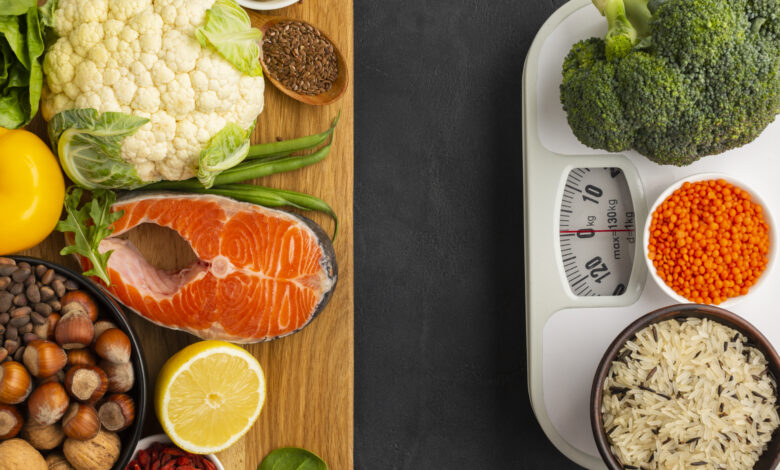High-Protein Diet for Weight Loss: Your Ultimate Guide to Shedding Pounds Effectively

In the quest for effective weight loss, the high-protein diet has emerged as a favorite among health enthusiasts and nutrition experts alike. Not only does this diet promote fat loss, but it also helps preserve muscle mass, making it a sustainable option for those looking to achieve and maintain a lean physique. This blog will delve into the science behind high-protein diets, their benefits, and how to incorporate them into your lifestyle.
Understanding the High-Protein Diet
A high-protein diet emphasizes consuming more protein-rich foods while maintaining a moderate intake of carbohydrates and fats. Proteins, composed of amino acids, are essential for building and repairing tissues, producing enzymes, and supporting overall bodily functions.
The rationale behind a high-protein diet for weight loss is its ability to enhance satiety, boost metabolism, and reduce calorie intake, ultimately leading to fat loss.
How Protein Supports Weight Loss
- Increased Satiety:
Protein is known to be more filling than fats and carbohydrates. It reduces hunger hormones like ghrelin while increasing the production of hormones like peptide YY, which promote a sense of fullness. - Thermogenic Effect:
The body uses more energy to digest and metabolize protein compared to fats and carbs. This thermogenic effect contributes to burning more calories. - Muscle Preservation:
When on a calorie deficit, the body may break down muscle for energy. Consuming adequate protein helps preserve lean muscle mass, which is crucial for maintaining a healthy metabolism. - Reduced Cravings:
High-protein meals can stabilize blood sugar levels, reducing sudden spikes and crashes that often lead to cravings and overeating.
Key Benefits of a High-Protein Diet
1. Effective Fat Loss
By keeping you fuller for longer and boosting your metabolic rate, high-protein diets can lead to significant fat loss without the need for extreme calorie restriction.
2. Improved Body Composition
This diet promotes fat loss while preserving muscle mass, resulting in a toned and defined appearance.
3. Support for Active Lifestyles
Protein aids in muscle repair and recovery, making it an excellent choice for athletes or individuals with active lifestyles.
4. Better Blood Sugar Control
High-protein diets can improve insulin sensitivity and stabilize blood sugar levels, reducing the risk of type 2 diabetes.
Incorporating a High-Protein Diet into Your Routine
Step 1: Calculate Your Protein Needs
The recommended dietary allowance (RDA) for protein is 0.8 grams per kilogram of body weight. For weight loss, aim for 1.2 to 2.2 grams per kilogram, depending on your activity level.
Step 2: Include Protein in Every Meal
Distribute your protein intake throughout the day to maximize its benefits. Examples:
- Breakfast: Greek yogurt with berries and nuts
- Lunch: Grilled chicken salad with avocado and quinoa
- Dinner: Baked salmon with steamed broccoli and sweet potatoes
- Snacks: Hard-boiled eggs, cottage cheese, or protein shakes
Step 3: Choose High-Quality Protein Sources
Opt for lean and nutrient-dense options, such as:
- Animal-Based: Chicken, turkey, fish, eggs, low-fat dairy, lean beef
- Plant-Based: Lentils, chickpeas, tofu, edamame, quinoa, nuts, and seeds
Step 4: Combine Protein with Other Nutrients
Pairing protein with healthy fats and complex carbohydrates ensures balanced meals and sustained energy levels.
Step 5: Monitor Portion Sizes
While protein is beneficial, consuming excessive amounts can lead to calorie surplus. Stick to appropriate portion sizes based on your dietary goals.
Potential Pitfalls and How to Avoid Them
- Lack of Variety:
Eating the same protein sources repeatedly can lead to boredom. Explore diverse options to keep meals exciting. - Neglecting Other Nutrients:
Focus on a balanced diet that includes fruits, vegetables, whole grains, and healthy fats to meet your nutritional needs. - Over-Reliance on Processed Protein:
Limit processed options like protein bars and powders. Prioritize whole foods for optimal health benefits.
Who Should Avoid a High-Protein Diet?
While high-protein diets are generally safe, individuals with kidney issues, liver conditions, or other specific health concerns should consult a healthcare professional before starting.
Conclusion
A high-protein diet can be a powerful tool for weight loss, offering benefits such as increased satiety, enhanced metabolism, and improved body composition. By focusing on high-quality protein sources, balanced meals, and appropriate portion sizes, you can achieve sustainable weight loss and overall better health.
As with any dietary change, consult a healthcare professional or registered dietitian to tailor the plan to your individual needs. Start your high-protein journey today and take a significant step toward a healthier, leaner you!




